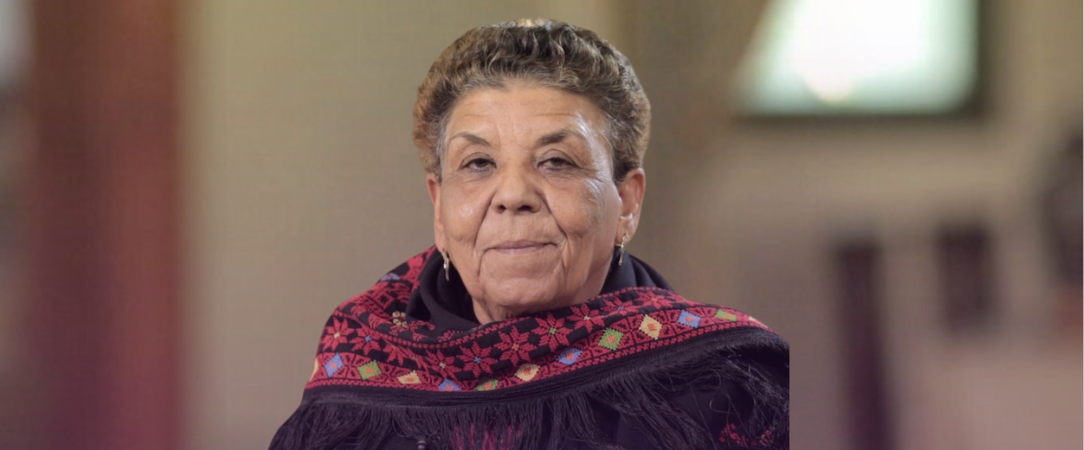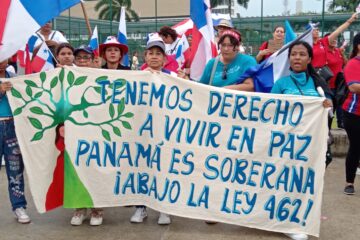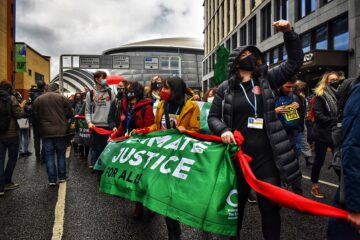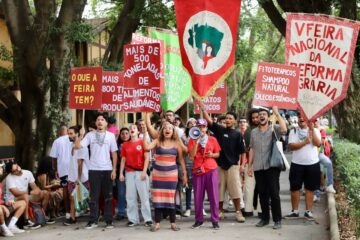Maryam Abu Daqqa, one of the pioneers of the feminist movement in Palestine, was one of the first Palestinian women to be subjected to captivity at the age of 15. She is still carrying the cause of her people and the right to recover stolen lands from a young age, despite being pursued by the Zionist occupation and displaced outside Palestine. However, she continued her struggle.
To convey the voice of the Palestinian people tortured by the occupying authority, she completed her doctorate in philosophy and wrote many research papers, including “The effects of long-term psychological and physical torture on freed female prisoners and the psychological and social impact on female prisoners from the reality of the autobiography” and she wrote books as “Freed Palestinian: Female Prisoners between Reality and Hopes” and “Women’s Political Participation in Palestine” and she also participated in many seminars in Palestinian universities. She was also the representative of male and female prisoners at many international conferences.
She was invited to France by French feminist organizations to hold lectures on the rights of Palestinian women, and she suffered from the effects of the Zionist occupation. However, in November she was arrested after she arrived in France because she defended Palestine and condemned the Israeli aggression on Gaza.
On November 13th, the French Council of State issued the decision. It is unfair to her, as the French administrative judiciary gives the green light to expel her from France, thus canceling the decision of the Administrative Court in Paris, which had suspended the Interior Ministry’s order to expel her. The Council of State said in its interpretation of the decision that “the Minister of the Interior has the right to assert that it was a mistake for the judge in the Administrative Court in Paris to suspend the expulsion” of the feminist activist Maryam Abu Daqqa, accusing her of the most heinous accusations of killing civilians in Israel and that she threatens the security of the state in her presence inside France. After that, she was released and deported to Egypt.
The World March of Women of the Middle East and North of Africa (WMW-MENA) region defends the rights of women throughout the Earth and demand a serious stance against such practices that violate human rights laws in the world, as well as the right to express one’s opinion and the right to defend oneself.
To denounce the persecution of Palestinians around the world, we publish on Capire an excerpt of a Maryam’s writing, called “The Return Journey”, send by her to WMW-MENA. “The Return Journey” is the only text she has with her right now, because all of her research and books are in her home in Gaza. Her house was bombed and all of her books were burned. The attacks of the Israeli arm in Palestine are destroying lives, communities, memory, and grassroots knowledge. This needs to stop immediately and permanently, giving way to a free and sovereign Palestine.

Return Journey
They say in novels that while dreams don’t come true, they alleviate the pain of bitter reality. They suppress the feeling of powerlessness and impossibility and relieve the dreamer from the bitter reality from which they wish to escape. But my dream was beyond the impossible since I was uprooted from my beloved homeland, Palestine, by the hands of the Zionists 24 hours after I left their heinous prison. My mind has never left my land, and for 30 years it continued to wander around our streets, my school, my house, and my neighborhood, among my friends, my comrades, and everything they have been exposed to in the neighborhoods where the occupiers had persecuted us in our youth, in the arms of my mother and father, among my sisters and brothers, among my beautiful and grim memories… I would often squeeze my eyelids, trying to wake up from the nightmare of alienation in the reality of the forced asylum that was carrying me, what mountains could not stand. How could I, a child, bear this torment and such a cruel journey away from my family, my homeland, and my beloved ones, wandering around a land I did not know, having to establish new family bonds and friends?
(…) I would often wake up with tears coming down my eyes… I was afraid to go back to sleep and have another nightmare. I go out to visit some friends that remained with me in exile; I enjoy with them. We comfort each other and one wonderful night that I will never forget for what it brought to me… By the end of a visit to the family of a friend (Saleh Abu Anza) who lives across the street from me, at midnight, I was going back home, and outside my apartment door, I heard my neighbor Umm Ali (Ali’s mother)—who is from a family of Syrian immigrants from the Golan and who, like the Palestinians, are now experiencing the crisis of alienation, refuge, and other things, just like my family—calling me with a concerned voice, “Maryam, did you get a call from your cousin from Jordan? He wants you to call him right away.”
(…) The most beautiful voice I have heard in 30 years… Through it, a wonderful song, the song of return to the embrace of the beloved homeland… To the embrace of my family, the embrace of my mother, oppressed by the torments of time, a voice that brought me back to childhood memories, full of sounds and meaning. Innocence, maturity, and struggle. (…) What will that be like? Will I redeem the past with its beauty and innocence? Will my heart bear this terrible moment? Will my tongue be able to pronounce the word “mom”? What is the new reality? How will I continue my struggle in this new reality? Will our people and family recognize me? How will they recognize me? So many questions… When will the sun come out? I want to scream and fill the world with my voice… I cannot bear this silence, everyone must know I will go back to Palestine. The hours went by as if they were motionless eternities, and my mother’s face was in front of me and would not let me go. I was tossing and turning as someone on hot coals…
(…) I got to my office, the women’s office… I met two sisters who were waiting for me and other sisters… I shouted: talk, laugh, be happy! I will go back to Palestine! I don’t know what I said, mixing up words that did not leave room for an answer… And I was moving with my voice to sing as if I were alone… My comrades and sisters were surprised and I felt this strange sadness in their faces… What are you saying? Yes, I am finally going back to Palestine… I’ve received a permission to visit it… I felt I was not balanced as I conveyed the message and I forgot they are my comrades who became my family, and it would be hard for them, despite the joy, to lose me suddenly and with no prior explanation… I stopped for a moment and then the conversation actually started… I explained my ideas and started to communicate with the leaders to inform them about it…
(…) I left in the morning to the Jordan Bridge and two comrades from inside [Palestine] were with me, one from Gaza (Magda Al-Saqqa) and one from the West Bank (Iman Assaf), and I asked them to wait before going, and to show me my house… I didn’t know where my house was anymore. We took the passenger bus to the Jordan Bridge… Despite the crowd, I was lost in thoughts, endless questions going through my head, and I was told that, on that day, the Palestinian police would be in charge of the bridge. I was prepared for any possibilities. I could not bear another minute of waiting… The air of my country penetrates my body and I cannot resist; between myself and my dream, there is a fine line between two words—one of these words will turn my life into hell, while the other will turn it into heaven: “no, you cannot get in for security reasons”, or the other, “yes, get in the country!”
(…) There are passenger vehicles to Gaza and the West Bank, and everyone calls the passengers and waits for them to leave. I told them, first of all I needed to call my twin sister and comrade Leila Khaled, to reassure her that I got in. Because she was sure I would go back to her. (…) Afterwards, the driver asked me which way I wanted to go, and I told him that what mattered was that he took me at the speed of light to my beloved village. But I wanted to drive by the sea and by the Saraya Prison to recall the dirty days of my imprisonment, and by my school (Al-Awda School), from where the first groups of guerrilla fighters came… And then, finally, home. The driver is the brother of a comrade with the Popular Front and there were Fatah brothers with us, and there was a long and broad discussion: about Oslo, about the return, and about the overall situation. My eyes were going through each grain of sand drove over by the wheels of the car. I used to keep sand from Gaza in a bottle that I would take everywhere with me in my life, as if I were carrying my homeland with me.
(…) In a few seconds, I encountered the entire village in front of me, as if the people had walked out of the tombs on Judgment Day. I did not recognize anyone. I did not recognize anyone, as if my head was nauseous. Total darkness became light. All houses were lit… A huge crowd. I want to see my mother’s face above all, I had to tell them. I want to see my mom. Come with me. Home. (…) My comrades organized the festivities to celebrate the return in the city of Khan Yunis and extended invitations to all brothers, sisters, friends, comrades, and family was in front of everything… Men, women, and young people wore the most beautiful pieces they had. Comrades came from all around and got together where the celebration was taking place. (…) I made a speech by the end of the festival to thank my comrades and my people for this wonderful hospitality. I sent them greetings from their comrades and their people in the diaspora and expressed their eagerness to return once again to the bosom of the homeland, to reaffirm our struggle to fulfill our dream of return and of an independent country, having Al-Quds Al-Sharif (Jerusalem) as its capital, while we turn our country into a democratic country where women and men are equal partners in the struggle and in building it.
(…) I am fundamentally concerned about serving the sons and daughters of my people to fight the occupation. This matter requires rapprochement and a unified culture built based on mutual sharing and rejecting everything that is negative or divisive. I felt that there was a huge cultural gap due to the stifling conditions our brave sector was exposed to and due to the criminal practices of the occupation. Gaza is a huge prison. Getting out of this situation is very complicated, and avoiding everything is the guideline in this situation. So I started my journey toward TV channels, public and popular seminars, and continuous meetings with people to find a common language and get to the truth—because I want us to get our feet on the right path together, not individually. I found that our people is wonderful and generous with no borders. My continuous conviction that our people is the people of miracles was confirmed, and it took a short period of diligence and work to find an echo to my voice in the hearts and minds of our dear people. The voice of their consciousness is and will continue to be the focus of my pride and appreciation for this heroic people, a firm people that performs miracles. They deserve life and freedom, and deserve a respectable leadership to be able to live safely.
___
Original language: Arabic




